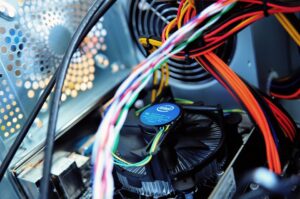PC
A PC, short for “Personal Computer,” refers to a type of computer designed for individual use by an end-user, typically for tasks such as word processing, web browsing, multimedia consumption, and general computing activities. A PC is a general-purpose computer that can be customized and expanded to meet the specific needs and preferences of the user. It consists of various hardware components, including a central processing unit (CPU), memory, storage devices (such as hard drives or solid-state drives), input/output peripherals (such as a keyboard, mouse, and monitor), and an operating system that enables the user to interact with the computer and run software applications. PCs are available in different form factors, such as desktop computers, laptops, and all-in-one computers, providing flexibility and versatility for various computing requirements.
Viruses
A computer virus is a malicious program or code that is designed to replicate itself and spread from one computer to another, typically without the knowledge or consent of the computer user. It attaches itself to legitimate programs or files and can cause a variety of harmful effects on the infected computer. Computer viruses are often created with the intention of causing damage, stealing sensitive information, disrupting computer operations, or gaining unauthorized access to systems. They can be spread through various means, including email attachments, infected websites, removable storage devices, or software downloads. Once a computer is infected, the virus can execute its code, replicate itself, and carry out its intended malicious activities, which may include deleting files, corrupting data, slowing down the system, or even rendering the computer inoperable. To protect against computer viruses, users are advised to use antivirus software, keep their operating system and applications up to date, exercise caution when opening email attachments or downloading files, and avoid visiting suspicious or untrustworthy websites.
Adware
Adware refers to a type of software that is designed to display advertisements on a computer or mobile device. Unlike malware, adware is not typically created with malicious intent or designed to cause harm. Instead, its primary purpose is to generate revenue for its creators by delivering targeted advertisements to users.
Malware
Malware, short for malicious software, is a term used to describe any type of software or code that is specifically designed to cause harm, disrupt computer operations, or gain unauthorized access to systems. It encompasses various malicious programs, including viruses, worms, Trojans, ransomware, spyware, and adware, which can damage files, steal sensitive information, compromise system security, or exploit vulnerabilities.


